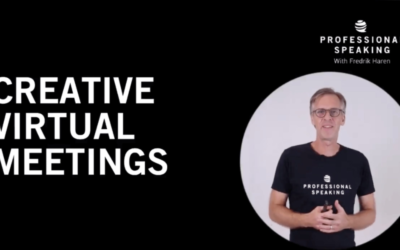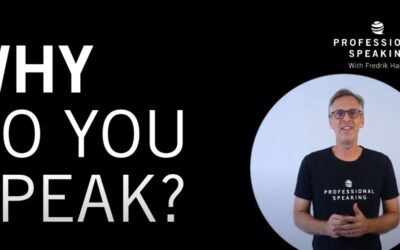I have heard many speakers give the advice that the best way to connect with an audience is to pick ONE person in the audience and speak to her. To lock in eye-contact with the one person in the room that looks the happiest to be there.
The argument is that by getting good vibes from that one person will spread to the rest of the group, and if you just speak too a big mass of non-identified bodies, then you will not communicate the same intimate feeling from the stage that you would get if you connect with one person.
I am not a big fan of that advice.
First of all I think you should scan the audience for as many facial expressions as possible. Look for happy faces, sad faces, angry faces, bored faces. It will tell you how the audience is feeling. And If you are going to have a conversation with a group of people you need to know how the group is feeling.
(Identifying the “happy face” in the audience might put you in a totally wrong mood if the rest of the audience is very stressed, for example. (Let’s say most of the audience just lost their job for example, then connecting with the happy person who got to keep his job might be the totally wrong thing to do.)
So do not pick one person to speak to – speak to the whole group. (and try to get eye contact with as many people as possible as you do that.)
Now having said that, I do think you should speak specifically to one person in the group. And that is the person who booked you.
Very often the person who recommended me to the speaker committee will be in the room when I give the speech. That is the person I speak to.
Because that is the person who went out on a limb to get me to speak.
If I screw up, then he (or she) is toast.
If I do a great speech, then that person reaps the rewards.
The very best review you can get as a speaker is when the person who recommended you comes back to you and says: “Everyone came up to me and asked: where did you find this guy!?”
It is not every time that you will know who recommended you to speak, but if you find out who it was, then make an effort to be introduced to that person and make sure you do a separate “speaker brief” with him or her.
Why did he (or she) think that you would be a great fit for this conference?
What did he (or she) like about your speech the last time they heard you?
Is there anything this person thinks that you should know about the audience?
To it right and you will deliver a great speech to the one person who thought you would be perfect for this conference. And by doing that there is a very big chance that the rest of the audience will like the speech too.
Lesson: Who got you the speech? Find that person. Learn from that person. Speak to that person (Both before the speech, and then speak TO that person when you are delivering your speech.) and you will be a hit.
Today I got one such email. It read.
“People loved Fredrik’s speech. Many of them kept asking me how we got him as he is so unique and got a very special sense of humour. Our Summit ended on a high note because of Fredrik”.
Mission accomplished.




